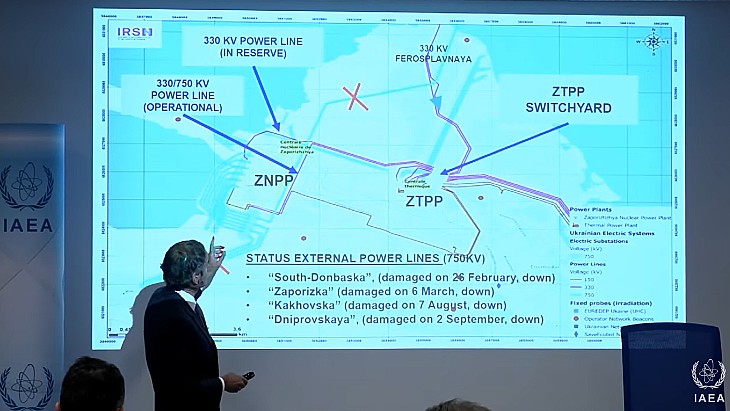In a media conference held at the IAEA's headquarters in Austria on Monday, Grossi was asked about the detail of the plan, and whether much progress was being made on it.
He said that the aim was to get a commitment from Russia and Ukraine not to attack or shell the plant. "We try to keep it simple, we try to make it practical, because we need it as soon as possible," said Grossi, when asked whether any agreement would need United Nations manpower or support from the United Nations Security Council.
He said that the two sides were "engaging and asking lots of questions". Issues being considered were the likely radius of such a safe zone and the presence of equipment which is currently on-site.
The media conference came after the last operating reactor at Zaporizhzhia was shut down on Sunday by Ukrainian operator Energoatom. That was a step taken after the restoration of the back-up power line providing the six-reactor plant with the electricity it needs for reactor and other essential safety functions.
Before the fixing of the back-up power line - which had been damaged by shelling last week - unit 6 had been providing the plant with the power it needed for its safety functions. But Grossi said this was not sustainable in the longer term.
The IAEA said a secure off-site power supply from the grid and back-up power supply systems were essential for ensuring nuclear safety, even when the reactors are no longer operating. Power is still required for reactor cooling and other systems needed to maintain safety.
Grossi welcomed the restoration "in very challenging circumstances" of one of the reserve power lines - which connects the power plant to the Ukrainian network through the switchyard of a thermal power station in nearby Enerhoda. But he added: "I remain gravely concerned about the situation at the plant, which remains in danger as long as any shelling continues."
He said that each of the six reactors had three emergency back up diesel generators "plus two more in reserve" which were the "last line" in case there was a loss of external power supply. It is believed there is about enough fuel on site for the diesel generators for 10 days.
Zaporizhzhia is the largest nuclear power plant in Europe. Russian military forces took control of it at the start of March, although it continues to be operated by its Ukrainian staff. It is near the frontline between Russian and Ukrainian forces, with shelling at the site on a number of occasions - the two sides blame the other.
There have also been attacks on other infrastructure in Ukraine which has led to blackouts. Asked if he was worried about other nuclear plants in the country, Grossi said that they were watching events closely but there were no critical situation elsewhere at the moment that had been reported to him.
An IAEA expert mission to Zaporizhzhia took place from 1 September for four days, with two of its experts now stationed at the plant permanently. It had been hoped that the IAEA team's presence would help to stabilise the situation, but shelling of the area, and disruption or loss of of external power lines, has continued.
The nuclear industry has called for the establishment of a protected zone around the plant in a joint statement issued by the American Nuclear Society, Canadian Nuclear Association, Canadian Nuclear Society, European Nuclear Society, Nuclear Energy Institute, Nuclear Industry Association, Nuclear Institute, Nucleareurope and World Nuclear Association.
It said: "A nuclear safety and security protection zone should be established immediately around the Zaporizhzhia nuclear power plant, as recommended by the United Nations’ International Atomic Energy Agency in their recent report. This would include the withdrawal of all military forces from the site and cessation of shelling and military activity in the vicinity of the plant.
"The global nuclear community supports the continuous presence of the IAEA at the Zaporizhzhia nuclear power plant to ensure the safety of staff and the physical integrity of the plant in the current extreme circumstances. The agency inspectors should have unrestricted and unmediated access to the operating staff and the areas of the facility to accurately assess conditions at the site.
"We stand ready to give the IAEA and Energoatom whatever support is necessary to ensure the safety of its nuclear facilities and staff."








_94566.jpeg)






